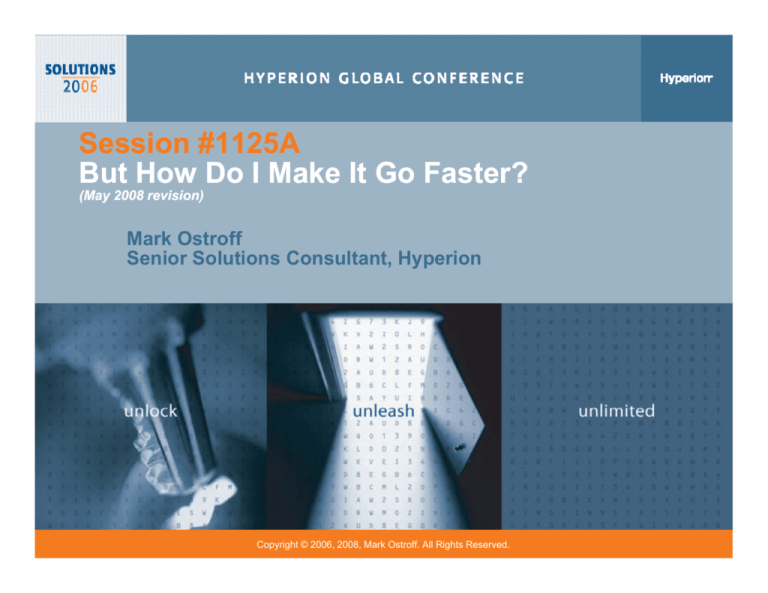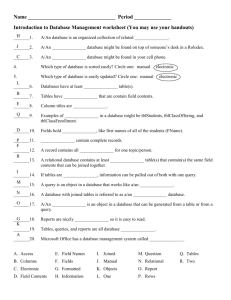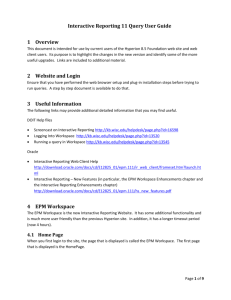
Session #1125A
But How Do I Make It Go Faster?
(May 2008 revision)
Mark Ostroff
Senior Solutions Consultant
Consultant, Hyperion
Copyright © 2006, 2008, Mark Ostroff. All Rights Reserved.
Agenda
Optimize your environment in these areas:
}
The database(s) being q
queried
eried
}
The network configuration
}
The server hardware used by the Hyperion software
}
Hyperion server tuning
}
The
e cclient
e hardware
ad ae
}
Hyperion Intelligence / Hyperion Interactive Reporting
documents
— The BQY file itself
— The DAS use of the BQY file
— Creative Job Scheduling
1125A | But How Do I Make It Go Faster?
P. 2
Before You Apply These Tips
Important Notes:
}
}
}
}
The tips in this presentation are offered as general guidelines
and idea suggestions. Not all tips will apply to your specific
implementation.
No attempt has been made to provide a complete listing of
optimization techniques. I have listed the ones that have
provided the biggest impact in the customer implementations in
which I have personally been involved
involved.
Some of these tips are mutually exclusive, so do NOT expect to
use all of them.
This May 2008 update adds new tips based on the added
capabilities available in v9.3.1 and in the Oracle BI Server
(which can be used as an ODBC “data source” for BQY
documents).
1125A | But How Do I Make It Go Faster?
P. 3
Optimizing the Database
Consider using one or more of the following:
}
Use a separate reporting database
}
Use a denormalized database schema (except with Teradata)
}
Create adequate field indexes
}
Use all appropriate database server software optimizations
}
Use appropriate
pp p
disk storage
g optimization
p
techniques
q
}
Select appropriate database technology
— Consider using the Oracle BI Server as a query optimizer
— Aggregate Navigation
Navigation, Intelligent Query Caching and Function Shipping
— Consider using Hyperion Essbase as a query optimizer
— Use the 80-20 rule to shield the transactional database from global queries
— Use Hyperion Essbase Hybrid Analysis to send only focused queries to the
relational
l ti
l store
t
1125A | But How Do I Make It Go Faster?
P. 4
Optimizing the Network
Consider using one or more of the following:
}
Place all associated servers on a single
single, high
high-speed
speed backbone
— Hyperion System 9 server
— Web server
— Database ser
server
er
}
Use a dedicated Web server and dedicated database servers
}
Check for throughput bottlenecks
}
Eliminate shared network connections
}
Update
p
any
y old network equipment
q p
1125A | But How Do I Make It Go Faster?
P. 5
Optimizing the Hyperion Server
Consider using one or more of the following:
}
Beef up the Hyperion server hardware
— More CPUs
— More RAM
— Faster,
Faster wider disks
— Faster system bus
— Appropriate use of RAID
}
Pl
Place
the
th Hyperion
H
i software
ft
on d
dedicated
di t d machines
hi
}
Place the DAS and BIService on dedicated machines
}
Replicate appropriate services such as DAS and BIService
1125A | But How Do I Make It Go Faster?
P. 6
Optimizing the User’s PC
Consider using one or more of the following:
}
Impro e the q
Improve
quality
alit of the net
network
ork cables
}
Improve the speed of the network connection
}
Check for adequate operational hardware
— Minimum of 1 MB of video RAM
— Dedicated video RAM (not shared)
— Sufficient processor RAM to avoid disk swapping
}
Set Windows virtual memory so initial = max to create a
permanent swap file
—
—
—
—
Right-click
Ri
ht li k “M
“My C
Computer”
t ” and
d select
l t “P
“Properties”
ti ”
In the “Advanced” tab, click on “Performance Options”
In the “Virtual memory” area, click on “Change…”
General Rule – Set to two times the physical RAM
1125A | But How Do I Make It Go Faster?
P. 7
Optimizing the BQY File
Concentrate on three basic areas to minimize:
}
Size of the BQY file itself
}
Amount of query processing
}
A
Amount
t off local
l
l re-calculation
l l ti processing
i
1125A | But How Do I Make It Go Faster?
P. 8
BQY File Size Optimizations
To make BQYs open faster:
}
Reduce the BQY file size
— Delete unused sections
— Use table sections instead of multiple queries
— Use summary data functions on all facts in the query (when
appropriate)
— Replace all BMP image files with PNG, GIF or JPEG equivalents
p
mode
— Save the BQY in Compressed
— For BQYs with many images (including long Report sections with
Page Header images), upgrade to v9.3.1 and use the new
Resource Manager
}
Use Drill-to-Detail to avoid fetching lots of data for drilling
— Set a topic or meta topic as a dimension
— Turn on the Drill-to-Detail option
— Create a query and change the data function of the facts to be
an appropriate summary function (SUM, AVG, MAX, etc.)
1125A | But How Do I Make It Go Faster?
P. 9
Query Processing Optimizations
To make BQYs operate faster:
}
}
}
}
Schedule long running queries rather than have each user
process them
Use Table sections with local filters instead of multiple queries
Consider using Hyperion Essbase Hybrid Analysis
Consider using Hyperion Production Reporting
— Can directlyy output
p to BQD format
— Can use as Import Data source with the Hyperion System 9
Analytic Bridge
}
For v6 users, upgrade to System 9
— Much smaller query processor task
— Uses multi-threading and connection pooling
— Significantly faster than Version 6
}
Consider using the Oracle BI Server as a middle tier
1125A | But How Do I Make It Go Faster?
P. 10
Oracle BI Server
Simplified, Powerful, Intelligence Across Sources
}
}
}
}
Simplified business model
view
Oracle BIEE+
Presentation
Services and
Hyperion BI Tools
Advanced calculation &
integration engine
Intelligent request
generation and optimized,
distributed data access
ODBC INTERFACE
Oracle BI
Server
Mission critical scalability
and performance
Native RDBMS
• Oracle
• SQL Server
• DB2
• Teradata
1125A | But How Do I Make It Go Faster?
Other 3rd Party
Tools
•
•
•
•
•
•
•
Simplified Business View
Unified Metadata
Intelligent Caching
Advanced Calculations
Aggregate Navigation & Creation
Federated Query and Integration
Optimized
p
SQL/Function
Q
Shipping
pp g
Multi-dimensional
• Essbase
• Oracle OLAP
• Microsoft
• SAP
Other
• XML
• Excel
• Text
P. 11
Query Processing Optimizations
To make BQYs operate faster:
}
Optimi e the list of values
Optimize
al es in Variable Limits
— When Variable Limits value lists are static
— Replace “Show Values” with a custom list (Select All, Transfer)
— When Variable Limit value lists are dynamic
— Use Lookup setting in OMI to point to lookup table, or…
— Use a separate “limit values” query with a Dashboard section
}
}
}
Optimize the topic order in all Query sections
Use pre- and post-process audit events to control the query
optimization plan
Consider using database hints (see your DBA first)
— Create a Computed Item as the FIRST field in the query’s
R
Request
t line
li
— Formula:
/*+<Hint> Comments */ 1
1125A | But How Do I Make It Go Faster?
P. 12
Query Processing Optimizations
To make BQYs operate faster:
}
}
Use Zero
Zero-Client
Client mode for users on slow network connections
Optimize the database middleware
— Oracle: Use OCE Advanced Options to:
— Increase the “Oracle Buffer Size” (3rd dialog box after logon)
— ODBC: Use the OCE Advanced Options to:
— Turn ON the “Use large buffer query mode” option
— OLEDB: Use ODBC instead (where possible)
}
For Teradata sources only:
— Use SELECT <field> GROUP BY <field> rather than SELECT
DISTINCT
— ALWAYS use a “LOCK FOR READ” View instead of direct
table access
1125A | But How Do I Make It Go Faster?
P. 13
Re-Calc Optimizations
To make BQYs open faster:
}
Use “Snapshot” mode for all results and tables
1125A | But How Do I Make It Go Faster?
P. 14
“Snapshot” Mode
}
Problem
— Computed Items are not saved and are being recalculated
}
Solution
— Go to Save Options and retain the values of Computed Items
}
How to
9 File > Save Options > Save Query Results with Document
9 Make sure checkboxes on both sides are checked
1125A | But How Do I Make It Go Faster?
P. 15
Re-Calc Optimizations
To make BQYs open faster:
}
Use “Snapshot” mode for all results and tables
}
Only use local sorting when absolutely needed
1125A | But How Do I Make It Go Faster?
P. 16
Avoid Local Sorting
}
Problem
— The Results and Table Sections are being sorted unnecessarily
}
Solution
— Wherever possible have the database sort the results
}
How to
— Remove Sort specifications from the BQY unless they are required
— Readabilityy
— Functionally required for computations (Prior / Next)
— Move the Sort spec from large result sets to the Sort line of the
Query Section
— Make
M k sure appropriate
i t database
d t b
iindices
di
exist
i t tto supportt th
the sortt
1125A | But How Do I Make It Go Faster?
P. 17
Re-Calc Optimizations
To make BQYs open faster:
}
Use “Snapshot” mode for all results and tables
}
Only use local sorting when absolutely needed
}
Control when sections are refreshed
— Charts and Pivots:
Refresh Data options
— Reports:
Dummy limits
}
Set the number of pre-gen pages for reports to 1
}
Remove all BQ*.INI files from virus scanning
1125A | But How Do I Make It Go Faster?
P. 18
Control Local Refresh
}
Problem
— There are too many Charts and Pivots with “Refresh After Process”
— Each Chart / Pivot needs to be recalculated even if it not visible
}
Solution
— Refresh the visible Charts / Pivots and only when required
}
How to
— No Dashboards in the BQY
— Use “Refresh on Activate”
— Dashboard Builder Dashboards
— Use “Refresh… on Active Dashboard“ in the Properties (7) step
— Other Dashboards
— Set each Chart / Pivot to “Refresh Manual”
— When dashboard Activates
— Refresh section’s Charts / Pivots if required
— Set to “Refresh After Process” to allow drill, etc.
— When dashboard Deactivates
— Set to “Refresh Manual”
1125A | But How Do I Make It Go Faster?
P. 19
Re-Calc Optimizations
To make BQYs operate faster:
}
Separate Computed Items from Local Limits
Why? Every limit change will recalculate every row of every
computed item column that resides in the same section
How:
— Create Computed Items in the Results Section
— Create one or more Table sections and place any local limits
there
— Build all reports,
reports charts,
charts and pivots from the Table section(s)
}
What if you already have limits and computed items together?
— Create appropriate Table sections, using the same field names
— Move the local limits to the Table sections
— Run the Optimize utility to re-host all reports, charts and pivots to
use the Table sections
NOTE – Optimize can also be used for other BQY maintenance
tasks
1125A | But How Do I Make It Go Faster?
P. 20
Before Re-Calc Optimization
Chart/Pivot
P
Parent
t is
i
Results
Sl
Slow
Li
Limits
it
Computed
C
t d
Items in
same section
1125A | But How Do I Make It Go Faster?
P. 21
After Re-Calc Optimization
Chart/Pivot
Parent is
Table
F t Limits
Fast
Li it
Not Computed
Items
1125A | But How Do I Make It Go Faster?
P. 22
A Real-Life Example
Operation
Original
BQY
Optimized
BQY
Open BQY
10 s
6s
Set filter on ACFT
7s
1s
Set filter on 3 years
24 s
3s
Clear all filters
10 s
2s
51 s
12 s
TOTAL TIME:
Optimization techniques used:
}
Enable Snapshot Mode
}
Move limits to Table sections
}
Change display parents to Table sections
1125A | But How Do I Make It Go Faster?
P. 23
Optimizing the Server’s Data
Access
Consider using one or more of the following:
}
Decrease the size of the BQY file
— Save the file without Results
— Purge all data from the file
}
Use compressed BQYs (memory is faster than disk)
}
Upgrade to at least System 9
}
Only use thread-safe
thread safe database middleware
}
Increase the DAS processing settings
— Increase the Java Stack, Java Heap and data access settings
(Read the appropriate Capacity Planning Guide for details)
— Increase the DAS time-out setting
— Increase network, Web server, etc. time-out settings
1125A | But How Do I Make It Go Faster?
P. 24
Optimizing the Server’s Data
Access
Dealing with DAS time-out issues
}
}
}
Issue: DAS times out when returning large query results
Solution: Add a larger DAS time-out settings (The default is 180
seconds)
How-to:
— Edit the web.xml file under servlet/deployment/web-inf
— Under the tag <servlet> with entry <servlet-name>DAServlet</servletname> add:
name>,
<init-param>
<param-name>DASREQ_TIMER_PARAM</param-name>
<param-value>180</param-value>
</init-param>
p
— Change the param-value to a larger value like 2400 and restart Tomcat
default server (or appropriate equivalent servlet engine)
1125A | But How Do I Make It Go Faster?
P. 25
Optimizing the Job Manager
Consider using one or more of the following:
}
Reduce the size of the BQY file used
— Save the document without Results before scheduling
— Use JavaScript code to control section generation:
a) Eliminate generation of report sections via dummy limit
b) Add an OnStartup script that removes the limit when opened
}
Decrease the viewer user load by scheduling output to
HTML or PDF and FTP the result to a “regular” Web server
1125A | But How Do I Make It Go Faster?
P. 26
Please Complete Your Session Evaluation
Session #1125A
But How Do I Make It Go Faster?
(May 2008 revision)
Mark Ostroff
Senior Solutions Consultant
Consultant, Hyperion
Copyright © 2006, 2008, Mark Ostroff. All Rights Reserved.




![Database Modeling and Implementation [Opens in New Window]](http://s3.studylib.net/store/data/008463861_1-79059dcf084d498c795a299377b768a6-300x300.png)

